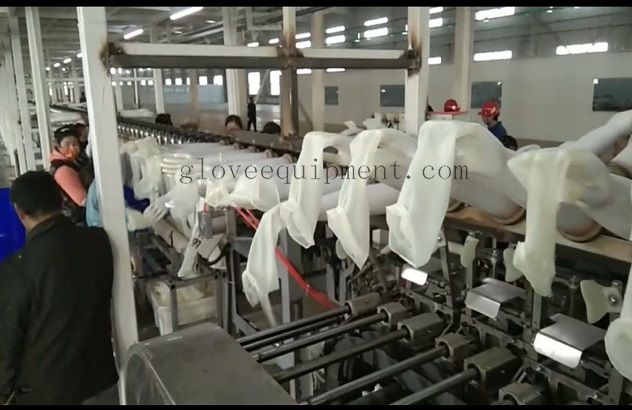Jun. 05, 2024
Setting up a household gloves production line involves several key steps, ranging from planning and design to equipment procurement and operational setup. Here’s an overview of the essential aspects to consider:
1. Market Research and Planning
- Market Analysis: Assess the demand for household gloves, identify target markets, and understand the competition.
- Product Specifications: Decide on the types of gloves (latex, nitrile, vinyl, etc.), sizes, and any specific features (e.g., textured surface, color).
2. Design and Layout
- Factory Layout: Plan the Household Gloves Production Line layout for efficient workflow, considering raw material storage, production area, quality control, and packaging.
- Environmental Considerations: Ensure compliance with local environmental regulations, especially for chemical handling.
3. Raw Materials
- Selection: Choose the appropriate raw materials, such as latex, nitrile, or PVC.
- Suppliers: Identify reliable suppliers for raw materials, ensuring consistent quality and supply.
4. Machinery and Equipment
- Production Line Components:
- Dipping Machines: Automated machines for dipping molds into the latex or nitrile solution.
- Drying Ovens: For curing the dipped gloves.
- Leaching Tanks: To remove excess chemicals and proteins.
- Beading and Stripping Machines: For forming the glove cuffs and removing gloves from molds.
- Formers: Molds shaped like hands on which gloves are formed.
- Ancillary Equipment:
- Mixing Tanks: For preparing the glove solution.
- Cooling Systems: For temperature control.
- Packing Machines: For packaging the finished gloves.

5. Production Process
1. Material Preparation: Mixing the raw materials to create the glove solution.
2. Dipping: Molds are dipped into the solution to form gloves.
3. Coagulation and Leaching: Coagulation of the glove material on the molds, followed by leaching to remove impurities.
4. Drying and Vulcanization: Curing the gloves in ovens to achieve desired strength and elasticity.
5. Beading: Rolling the cuff ends to form beads for easy wearing.
6. Stripping: Removing the gloves from the molds.
7. Inspection and Quality Control: Checking for defects and ensuring gloves meet quality standards.
8. Packaging: Packing the gloves for shipment.
6. Quality Control
- Inspection: Regular inspections at various stages of production.
- Testing: Physical and chemical testing of gloves to ensure compliance with safety and quality standards.
7. Workforce and Training
- Staffing: Hiring skilled operators, technicians, and quality control personnel.
- Training: Providing training on operating machinery, safety protocols, and quality control procedures.
8. Regulatory Compliance
- Standards: Ensuring compliance with industry standards and regulations (e.g., FDA, ISO, CE).
- Certifications: Obtaining necessary certifications for production and export.
9. Safety Measures
- Protective Equipment: Providing protective gear for workers.
- Safety Protocols: Implementing safety procedures for handling chemicals and operating machinery.
10. Maintenance and Support
- Routine Maintenance: Regular servicing of machinery to prevent downtime.
- Technical Support: Having a support team for troubleshooting and repairs.
11. Sustainability Considerations
- Waste Management: Implementing waste disposal and recycling systems.
- Energy Efficiency: Using energy-efficient machinery and processes.
Summary
Setting up a household gloves production line requires careful planning, investment in quality machinery, adherence to safety and quality standards, and efficient management of resources. By focusing on these aspects, you can establish a successful production line that meets market demands and regulatory requirements.
Previous: What is DTH Drill Pipe and Its Application?
Next: The Best Places to Buy metal scrap crushing machine Online and In-Store
If you are interested in sending in a Guest Blogger Submission,welcome to write for us!
All Comments ( 0 )